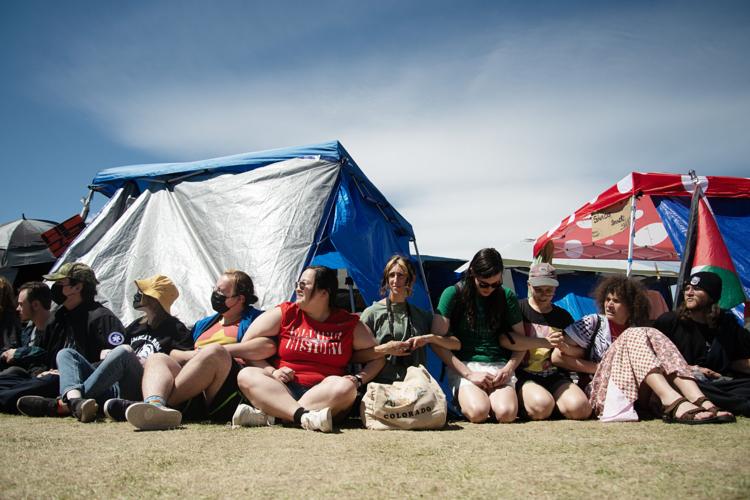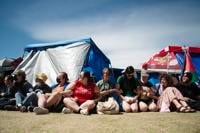Pro-Palestinian activists walked out of classes in Colorado on Wednesday, as protest actions began to spread across universities in the state, albeit more muted than the violent clashes in California and elsewhere in the country.
For now, university officials have signaled that graduation ceremonies are on track and no classes have been canceled.
The situation, however, remained tense in Colorado.
“Oh, yeah, they’re scared," said Daniel Bennett, executive director of Hillel Colorado, referring to Jewish students. An affiliate of Hillel International, the Colorado group serves more than 2,000 Jewish students in metro Denver and northern Colorado.
At the Auraria Campus in Denver, the scene of the first protest action at a university in Colorado following the demonstrations at Columbia University, officials said they are seeking a "peaceful resolution." More specifically they seek a path to remove the encampment that protesters have erected in the last few days.
University officials said the tents violate campus policy, and a spokesperson said they have not had discussions about disciplinary actions, if any, to be leveled at students who have been arrested. At some other schools in the country, administrators have begun suspending student protesters.
At the University of Colorado Boulder, about 50 students walked out of classes to call for the university's divestment from companies with ties to Israel. The demonstration drew a pro-Israel counter-protest.
The protests, which lasted an hour, were peaceful and "both sides were respectful," CU Boulder spokesperson Nicole Mueksch said.
"They followed all policies and procedures on campus," she said, adding the university supports the rights of students to conduct a peaceful protest.
Meanwhile, around 250 people protested at the Colorado College's Tavo Quad near downtown Colorado Springs. Some 30 faculty members cancelled their morning classes to allow for the class walkout.
"I’m here for Palestinian liberation, and I don’t agree with the efforts of CC (Colorado College) to disband our actions and I’m hoping that they can divest from Israel, as well," a student protester told The Gazette.
The student protesters refused to provide their names due to fears of retaliation from Colorado College officials.
The scenes across Colorado come amid the wave of pro-Palestinian rallies that rocked many college campuses across the United States in the last few weeks and increasing worries by Jewish students for their physical safety.
Bennett of Hillel Colorado described many of the pro-Palestinian chants and demands for divestment "antisemitic," arguing those demands "aren't being made anywhere else around the world."
"If you hold Israel to a different standard than you hold America or Canada, or anywhere else, then you're bordering on antisemitism," Bennett said. "That's the Jewish ancestral home."
Since the war — sparked by Hamas killing 1,200 in southern Israel began — students in Colorado College have organized a "teach-in" in support of the Palestinian people, protested outside of a work session featuring the Anti-Defamation League and conducted a sit-in at the Charles L. Tutt Library.
The Catalyst, the Colorado College newspaper, previously reported that students who participated in the sit-in are now the subject of "conduct" cases, prompting some faculty members to defend their action, saying their right to peaceful assembly was violated.
The college's policy states that students, staff and faculty may participate in demonstrations as long as they don't disrupt any college business or activity. It also specifies that faculty can participate in protests, as long as they "ensure that they in no way represent themselves as a spokesperson for the college."
Following Wednesday's rally, Colorado College's Dean of College Pedro de Araujo said that no policies appeared to have been violated and that administration would prepare accordingly for any future demonstrations.
"Really, it went beautifully, I think," he said. "Especially different than some of the other colleges recently."
At some places in the country, demonstrations have been marked by violence.
At the University of California Los Angeles, the chancellor said counter-protesters “forcefully" attacked a pro-Palestinian encampment on Wednesday.
At the University of Wisconsin in Madison, activists clashed with police officers who destroyed their tents. Four officers were injured, including a state trooper who was hit in the head with a skateboard, authorities said. More tents sprang up within hours. More than 30 people were initially detained, but police said only four were charged with battering law enforcement.
The chaotic scenes unfolded after police officers entered a building occupied by pro-Palestinian protesters at Columbia University on Tuesday night, breaking up a demonstration that had paralyzed the school.
In Denver, protesters began occupying the Auraria Campus last Thursday. The next day, the police dismantled tents and arrested about 40 protesters. Auraria Campus officials defended the arrests by noting the encampment violates campus policy. They also suggested that "national disruptors" had infiltrated the protest.
Ignoring university officials, pro-Palestinian protesters set up roughly 40 tents over the weekend, saying they are prepared to "defend" the encampment until their demands — notably divestment from companies that operate in Israel — are met.
The protesters and university officials remained at a standoff following a meeting between the two sides on Tuesday. The pro-Palestinian protesters told university officials they are engaged in "civil disobedience" and have no plans to dismantle the tents, according to a summary of the meeting provided by Auraria Campus authorities. During that meeting, officials reiterated to the activists that they may engage in a peaceful protest but they need to take the encampment down, as it violates campus policy.
When asked if protesters face suspension, as what has happened in some other parts of the country, Jennifer Woodruff of the University of Colorado Denver told The Denver Gazette that students arrested for violating campus policies are booked by the Denver Police Department.
"We have not had discussions or made specific determinations about conduct and campus-specific implications," Woodruff said. "Also, we have learned that some of those involved are outside actors unaffiliated with Auraria Campus institutions."
Asked the same question, Tim Carroll, who speaks for Metropolitan State University of Denver, replied, "Peacefully protesting is not a violation of the MSU Denver Student Code of Conduct and is protected by the First Amendment. MSU Denver does not discipline students for peacefully protesting."
The Associated Press and Gazette reporters Abbey Soukup and Eric Young contributed to this report.










 Your Privacy Choices
Your Privacy Choices